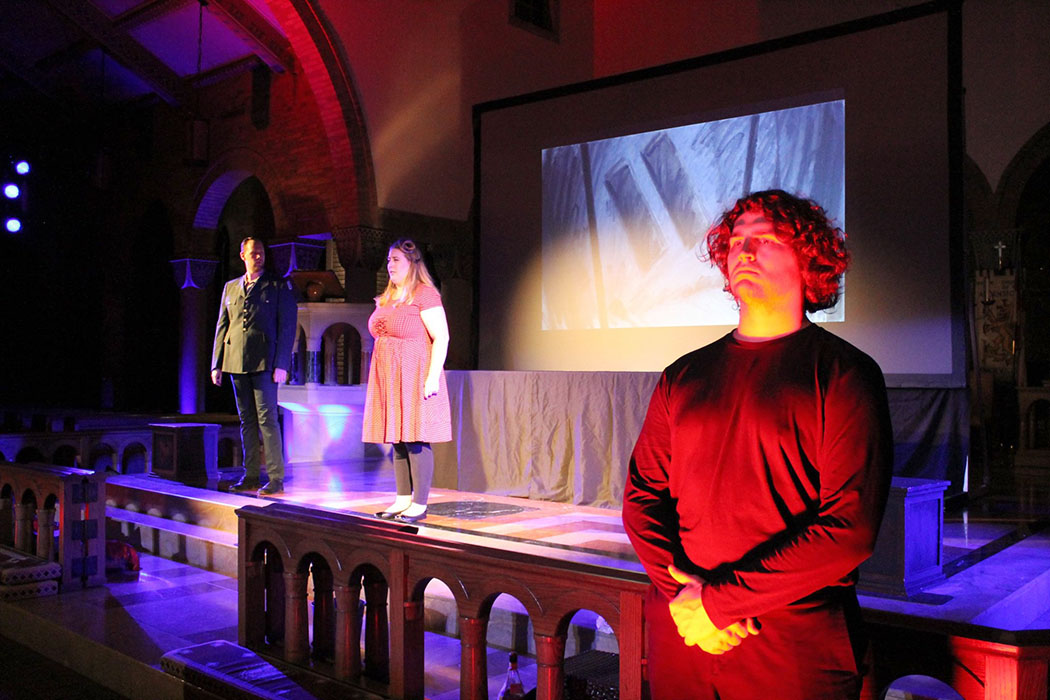Imagine Berlin in the days immediately following the fall of the Third Reich—a city being punished with physical and psychological destruction for its figurehead role in World War II. Although the war’s bombing caused many Berliners to flee for safety elsewhere, those unable to do so became victims of food shortages, and the ravages and revenge for Nazi atrocities taken by the occupying Russian forces. Personal diaries have subsequently revealed that the rape of German women by occupying forces was particularly widespread, with Soviet commanders willing to overlook sexual assaults. Faced with the inevitable, the German women sought ways to avoid the particularly violent gang rapes, often by taking up with a “wolf”, usually a senior Allied officer who provided protection from the soldier “beasts” in return for an admittedly ambiguous relationship.
Such is the background for Marble City Opera’s latest captivating offering, the U.S. premiere of City of Ashes, which opened last evening and has one more performance tonight at Church of the Ascension. With music by Evan Fein and a libretto by Knoxvillian Emily Anderson, City of Ashes follows two German women, the roommates Lotte and Lilli, who are trying to survive amidst the violence and carnage of Berlin’s occupation. Owen, a Welsh army officer in the Allied occupying forces, becomes Lotte’s “wolf”, a relationship that begins as transactional, but later evolves into a true romance.
Given the subject matter of destruction and assault, one might naturally expect an opera of violent, jagged drama and betrayal, reflected in tones of harsh musical complexity and dissonance. Quite the opposite, in fact—City of Ashes is nothing of the sort. More Benjamin Britten than Shostakovich, Fein’s score is gently lyrical, both in the vocal writing and the piano underpinnings—a lyricism that, at first, surprises the listener with its non-aggressive tonality. While such tonal matter-of-factness seems at conflict with the harshness of the implied drama of the story, Fein’s musical style allowed the singers the tonal freedom to sculpt their characters gently, and, ultimately, to suggest hope and optimism from Anderson’s narrative.

The City of Ashes cast of three singers was—in a word—excellent. While Fein avoids extremes of range in the vocal roles, their sweet spot is, indeed, sweet. Singing Lotte was mezzo-soprano Aubrey Odle with Lotte’s roommate, Lilli, sung by soprano April Martin. Both singers had fabulous English diction for Anderson’s libretto with each having a distinctive and oh-so attractive vocal clarity that also combined beautifully in Fein’s duets.
Owen, Lotte’s “wolf”, seemed a perfect role, both musically and dramatically, for bass-baritone Brent Hetherington, a face and voice familiar to Knoxville audiences for his performances with the UT Opera Theatre. Hetherington used his rich resonance to paint Owen as a solid, sympathetic character who is, himself, searching the rubble for some kind of happiness.

Like many of the previous Marble City Opera productions staged in non-theatrical venues, City of Ashes uses a combination of “what’s available” and the judicious theatrical use of props and minimal set pieces—in this case, the available levels and railings of the Church of Ascension apse. However, director Marya Barry has gone a step or two further on this occasion, integrating lighting (Jeff Pless) and a projection screen to establish environment using the work’s original Barry Spann abstract illustrations depicting a city of rubble. Especially notable and effective was Barry’s inventive movements for two un-named, non-speaking characters (Logan Campbell and Derek Stull) who portrayed symbolically the entirety of the Russian occupiers and their motivations. The two moved about their tasks (including depictions of rape) with geometric rigidity that vividly contrasted with Lotte and Lille’s softer human movements.
The production’s music director was Marble City Opera regular Brandon Coffer, who also performed the piano score, giving the piece a solid pacing and a nice contrast of emotions and styles that punctuate the piece. I understand that Fein has not orchestrated the work as of yet, something that seems like an inevitable necessity for this captivating piece of music-theatre.
September 12 and 13 – 8:00 PM
Church of the Ascension
800 S Northshore Drive, Knoxville
Tickets







